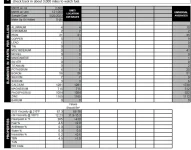From oil testing - explanation of the results for the fuel in the system.
"Because #2 diesel fuel typically has a viscosity of around 1.9-4.1 cSt at 40°C, which is thinner than a typical 15W40 engine oil with a viscosity of around 14.7 cSt at 100°C, fuel dilution reduces the engine oil's viscosity. When the oil's viscosity is lower than one (1) cSt from the known starting viscosity of the oil when new, we will confirm fuel dilution by ASTM D7593 GC method, reporting the result as percent by volume. However, if lubricant grade is not included with the sample, fuel dilution will be confirmed by GC if viscosity is below 13.3 cSt for diesel engine oil and below 9.8 cSt for gasoline engine oil. If viscosity is above the oil's mid-point for the grade, fuel dilution will be reported as
So that 8% can be just because the oil dropped to 12.5 cst that is about 3 sct drop as new oil (15.4 cSt at 100 ºC).
My question to specialist here - does it lot if after 9,000 miles 5.0 liter diesel engine lost 3 cSt?
"Because #2 diesel fuel typically has a viscosity of around 1.9-4.1 cSt at 40°C, which is thinner than a typical 15W40 engine oil with a viscosity of around 14.7 cSt at 100°C, fuel dilution reduces the engine oil's viscosity. When the oil's viscosity is lower than one (1) cSt from the known starting viscosity of the oil when new, we will confirm fuel dilution by ASTM D7593 GC method, reporting the result as percent by volume. However, if lubricant grade is not included with the sample, fuel dilution will be confirmed by GC if viscosity is below 13.3 cSt for diesel engine oil and below 9.8 cSt for gasoline engine oil. If viscosity is above the oil's mid-point for the grade, fuel dilution will be reported as
So that 8% can be just because the oil dropped to 12.5 cst that is about 3 sct drop as new oil (15.4 cSt at 100 ºC).
My question to specialist here - does it lot if after 9,000 miles 5.0 liter diesel engine lost 3 cSt?

